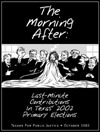The Morning After: Last-Minute Contributions In Texas’ 2002 Primary Elections
I. Introduction

| [ The Morning After: Last-Minute Contributions In Texas’ 2002 Primary Elections I. Introduction |
 |
Texas politics officially became more dangerous than unprotected sex in February 1997. That’s when the FDA approved the use of the morning-after pill to allow a woman who has just had unsafe sex to prevent pregnancy. Voters have no such remedy in Texas, where they often do not learn the amounts nor the origins of prodigious inflows of campaign funds until after an election is over. This system subjects voters to rude awakenings the morning after an election, when they may confront a public official-elect who no longer resembles the candidate who courted them during their campaign honeymoon.Texas elections law generally requires candidates to file itemized contribution and expenditure reports every six months.1 These biannual reports are the only disclosures filed by candidates who face no opponent in their primary or general election.2 Candidates in contested primaries, run-offs or general elections must file additional disclosures that are respectively due 30 days and eight days before a contested election. The last report—due eight days before the election—covers contributions and expenditures made up until 10 days before the election. Finally, during the last nine days of a campaign, non-judicial candidates resort to individual “telegram reports” to report large contributions (of at least $200 for house candidates and $1,000 for statewide and senate candidates). Since campaigns file telegram reports within 48 hours of receiving a donation, most contributions received in the last two days of a campaign are disclosed in the semi-annual reports that are filed months after the corresponding election is over. Judicial campaigns do not even file the telegram reports, assuring that last-minute contributions are disclosed after the election.
The media cannot report on contributions that are not disclosed and rarely report on any of the irregular telegram reports that are filed in the final days of a campaign. As a result, this last-minute money typically eludes the public’s radar altogether. While the public remains in the dark, political insiders know that controversial donations can be made in the eleventh hour to evade pre-election scrutiny.
Because a disproportional share of this money flows to candidates in close races, the outcomes of some Texas elections arguably are determined by late money that evades public scrutiny until after the affected election is over. For example, the largest recipient of late money in the 2002 primaries was Senator Jeff Wentworth. Wentworth narrowly fended off a primary challenge by John Shields, winning the primary by a margin of 1,216 votes (51.17 percent) in an election marred by serious voting irregularities.3 Wentworth received $157,435 in the last nine days of that campaign, with $22,600 flowing on the day before the election or on election day itself. Anti-gambling voters might have been interested to know, for example, that the casino-owning Tigua Indian Reservation gave Wentworth $10,000 the day before the election.
Voters favoring reproductive choice, on the other hand, might have been interested to know that Austin investors David and Douglas Hartman moved $25,000 eight days before the election to John Shields, who opposed Wentworth—the Texas Legislature’s only pro-choice Republican. John Shields donor David Hartman is a major backer of the conservative Lone Star Report, which is critical of reproductive choice.4 Significantly, neither the Hartmans nor the Tiguas contributed to this race earlier in the campaign when there was greater risk of pre-election scrutiny. Shields also received $395,000 in campaign loans in the last nine days of his primary campaign, echoing the 1998 lieutenant governor’s race, which Rick Perry narrowly won after chemical magnate William McMinn and anti-abortion activist James Leininger guaranteed a last-minute $1.1 million campaign loan. Perry borrowed that money from a bank that David Hartman founded.5
As stealth funds start flowing for the 2002 general election, this report reveals which donors and candidates made the greatest use of last-minute funds in the 2002 primary and runoff.
1 Contributions of less than $50 must be reported but need not be itemized.
2 These unopposed candidates do not report the money that they raise after June 30th of an election year until more than two months after the general election is over (the deadline is January 15 of the next year).
3 “Wentworth, Shields Battle Still In Air,” Austin American-Statesman, March 13, 2002.
4 See Lone Star Report: “Biting the Hand That Feeds You,” November 29, 2000; “Update: Charitable campaign still funding activists,” October 26, 2001.
5 Hartman, who sold his Hartland Bank to Compass Bancshares in 1999, is an ex-director of Leininger’s Texas Public Policy Foundation. Shields’ last-minute loans included $300,000 from himself, $70,000 loan from flight-school founder Richard Fessler and $25,000 loan from San Antonio’s G.L. Guerra, Jr.